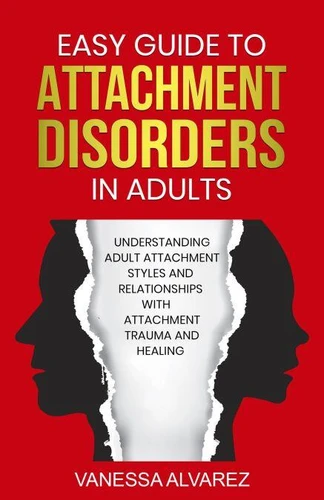Easy Guide to Attachment Disorders in Adults: Understanding Adult Attachment Styles With Relationships And Attachment Trauma And Healing
Par :Formats :
Disponible dans votre compte client Decitre ou Furet du Nord dès validation de votre commande. Le format ePub est :
- Compatible avec une lecture sur My Vivlio (smartphone, tablette, ordinateur)
- Compatible avec une lecture sur liseuses Vivlio
- Pour les liseuses autres que Vivlio, vous devez utiliser le logiciel Adobe Digital Edition. Non compatible avec la lecture sur les liseuses Kindle, Remarkable et Sony
 , qui est-ce ?
, qui est-ce ?Notre partenaire de plateforme de lecture numérique où vous retrouverez l'ensemble de vos ebooks gratuitement
Pour en savoir plus sur nos ebooks, consultez notre aide en ligne ici
- FormatePub
- ISBN8215449707
- EAN9798215449707
- Date de parution02/10/2022
- Protection num.pas de protection
- Infos supplémentairesepub
- ÉditeurWMG Publishing
Résumé
If you're like many adults today, you've experienced some kind of loss of a loved one. Whether it was a parent, spouse, sibling, friend, or child, losing someone close hurts. People who develop attachment disorders have trouble regulating emotions and forming healthy relationships. They think negatively about themselves and find it hard to trust others. They often withdraw from social situations because they fear rejection.
Some develop fears of intimacy and relationships. Others struggle with anger management issues. Still, others have difficulties controlling impulses and acting responsibly. But, an attachment disorder doesn't mean you'll never recover. Many people overcome these challenges through therapy and support groups. The book describes how attachment disorders affect adults, what they look like, and how to recognize them.
It discusses the different types of attachment disorders, such as secure, avoidant, ambivalent/resistant, disorganized, and unresolved, and describes how they are diagnosed and treated. The authors discuss common comorbidities associated with ADs, including anxiety disorder, mood disorder, substance use disorder, eating disorders, personality disorders, and trauma exposure. The Vanessa Alvarez explains why people develop these disorders, and he provides advice on how to help someone who suffers from one.
She also includes suggestions for parents, teachers, and therapists.
Some develop fears of intimacy and relationships. Others struggle with anger management issues. Still, others have difficulties controlling impulses and acting responsibly. But, an attachment disorder doesn't mean you'll never recover. Many people overcome these challenges through therapy and support groups. The book describes how attachment disorders affect adults, what they look like, and how to recognize them.
It discusses the different types of attachment disorders, such as secure, avoidant, ambivalent/resistant, disorganized, and unresolved, and describes how they are diagnosed and treated. The authors discuss common comorbidities associated with ADs, including anxiety disorder, mood disorder, substance use disorder, eating disorders, personality disorders, and trauma exposure. The Vanessa Alvarez explains why people develop these disorders, and he provides advice on how to help someone who suffers from one.
She also includes suggestions for parents, teachers, and therapists.
If you're like many adults today, you've experienced some kind of loss of a loved one. Whether it was a parent, spouse, sibling, friend, or child, losing someone close hurts. People who develop attachment disorders have trouble regulating emotions and forming healthy relationships. They think negatively about themselves and find it hard to trust others. They often withdraw from social situations because they fear rejection.
Some develop fears of intimacy and relationships. Others struggle with anger management issues. Still, others have difficulties controlling impulses and acting responsibly. But, an attachment disorder doesn't mean you'll never recover. Many people overcome these challenges through therapy and support groups. The book describes how attachment disorders affect adults, what they look like, and how to recognize them.
It discusses the different types of attachment disorders, such as secure, avoidant, ambivalent/resistant, disorganized, and unresolved, and describes how they are diagnosed and treated. The authors discuss common comorbidities associated with ADs, including anxiety disorder, mood disorder, substance use disorder, eating disorders, personality disorders, and trauma exposure. The Vanessa Alvarez explains why people develop these disorders, and he provides advice on how to help someone who suffers from one.
She also includes suggestions for parents, teachers, and therapists.
Some develop fears of intimacy and relationships. Others struggle with anger management issues. Still, others have difficulties controlling impulses and acting responsibly. But, an attachment disorder doesn't mean you'll never recover. Many people overcome these challenges through therapy and support groups. The book describes how attachment disorders affect adults, what they look like, and how to recognize them.
It discusses the different types of attachment disorders, such as secure, avoidant, ambivalent/resistant, disorganized, and unresolved, and describes how they are diagnosed and treated. The authors discuss common comorbidities associated with ADs, including anxiety disorder, mood disorder, substance use disorder, eating disorders, personality disorders, and trauma exposure. The Vanessa Alvarez explains why people develop these disorders, and he provides advice on how to help someone who suffers from one.
She also includes suggestions for parents, teachers, and therapists.






